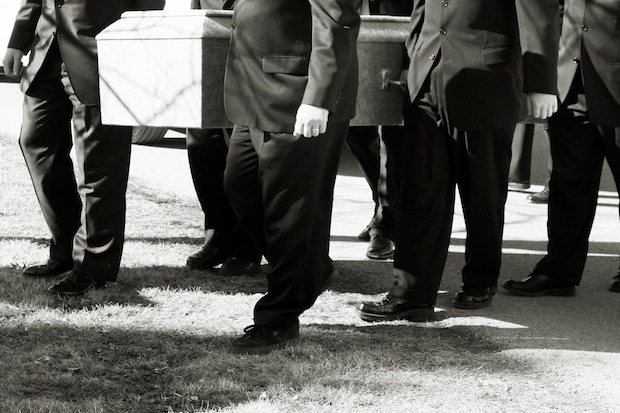I am in a yurt, talking about death. Everyone is seated in a circle, and I am the next-to-last person to share. The last of the summer sun is shining through the entrance. At one end is a display coffin of biodegradable willow — there’s also tea and coffee, and coffin-shaped biscuits with skeleton-shaped icing.
‘I am a reporter,’ I say. ‘I’ve come to cover this event. But don’t worry, I won’t report what you share in this yurt. Also, I have cancer. I have been in treatment for one year, but now the treatment is over. I take one day at a time.’
There is silence, then hugs. I thought I would cry, but I don’t. Instead, I feel acceptance and a strange kernel of satisfaction. For the rest of my time here I am Death Girl, shrouded in drama.
The yurt is on the grounds of a beachfront hotel in Bournemouth. I am attending the Good Funeral Awards, meant to honour the best in the business. Running up to the awards dinner there are a series of activities such as the ‘death cafe’ I am participating in, where people mingle to mull mortality. Death cafes are now taking place all over the world, as Mark Mason has written in this magazine, but the weekend also will feature a number of speakers on subjects such as the use of LSD in the care of the terminally ill, memorial tattoos and what to wear for your final journey. An award will go to the embalmer of the year — a miniature coffin in the style of an Oscar.
I arrived expecting a weekend of black comedy. This is what I find, but there’s something else — a sincerity and straightforwardness that takes me by surprise. Many of the attendees are involved in the death business, as coffin makers and corpse tailors and funeral celebrants, because they feel our society does not pay enough attention to death. We avoid it, plaster over it, try to pretty it up and Botox it out of existence.
Even old age is taboo. As we all live longer and longer, so our actors and actresses, politicians and pop stars get younger every decade.
‘Why do we do this, when death is something that happens to all of us?’ lamented one woman.
Why, indeed? I’d done it too, until I discovered my illness. Then I thought of little else — about the fragility of life, the permanence of death. Friends sent me amulets, prayers, ginseng, ‘positive energy’. My heart opened, and something flooded in. What if death were not disconnection, but connection? What if we were just going to meet our Maker? Then death would not be severance, but reunion. It is not at all a fashionable point of view, but I believe in God — and a good one, at that. The belief fills me with healing, wonderful hope. It is the hope not that I will live. It is the hope that I am loved.
The awards dinner is actually a happy affair. The great and good of the funeral industry quaff champagne and exchange jokes. Opposite me at my table is a woman who runs a funeral company. She is flanked by her husband, who also manages the business, and her brother, who is up for gravedigger of the year. The actress Pam St Clement, whose EastEnders character Pat Butcher died on-screen in January last year, is here to present the prizes. Everyone claps and cheers. In the midst of death, we are in life.
It’s a fine line between the two. Looking at the people around me, women in evening dress and men in black tie, it strikes me that death can be a glamorous affair. I wonder if, working with funerals and the bereaved, one can also be too attached to the idea of death, taking refuge in it. That’s another thing I’ve realised, too. Twelve months of ill health, hospitals, medicines — while they were tough, they also gave me an identity. I am a journalist and death gave me a story.
I realise that although I am frightened of dying, there’s a also a tiny part of me that’s always been scared of living. The finality of death is hard. The uncertainties of life can be harder.
After the dinner, the winners and losers of the Good Funeral Awards get up to dance. I peek into the ballroom bespeckled with lights. What will they play? ‘Born to Die’? ‘Forever Young’? Perhaps ‘I Will Survive’? Or ‘Stayin’ Alive’? I decide I’ll take a cab back to my bed-and-breakfast and watch Michael McIntyre’s Comedy Roadshow on telly. Perhaps this is not the time for me to dance with death.






Comments